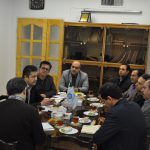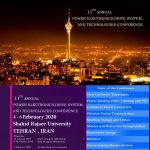Iran and Australia Discussed Bilateral Scientific Cooperation
The new Australian ambassador to Tehran, Ambassador Lyndall Sachs, paid a visit to the Ministry of Science, Research and Technology to have a meeting with Minister Gholami and Prof. Salar Amoli, the Acting Minister for International Scientific Cooperation.
In this meeting, both sides expressed their will on sustaining and expanding scientific cooperation between the two countries, and the pleasant previous experiences of scientific cooperation between the two countries.
Minister Gholami emphasised on the supporting and policy making role of the ministries, and the fact that implementation of international cooperation is solely the role and responsibility of universities. Noting the recent science and research achievements of Iranian and Australian universities, Minister Gholami highlighted Iran’s recent achievements at its 43 Science and Technology Parks, and their successes in commercialisation of theirs and university research outputs. He further added Iran’s interest in sharing these experiences with other ST Park and research centres in Australia and learning from their experiences, and hoped for Iran and Australia’s scientific cooperation to expand, as it can be useful for both societies.
Given the multi-cultural background of Australia, Minister Gholami also expressed Iran’s readiness in admitting Australian students in all fields, and in particular History, Persian Language and Literature, Iranology and Iranian and Islamic Art and Philosophy. He also introduced the Centre for International Scientific Cooperation, and its director, Prof. Salar Amoli as the main contact point for enquiries on Iran-Australia cooperation at the MSRT.
Ambassador Sachs also announced that Iranian student are the second largest international students in Australia and are among the best students; who have high intelligence and adaptability, where good sense of humour is the common character of Iranian and Australian people.
Moreover, Ms Sachs also noted the low number of Australian students in Iran, and referred to deficiency in the Persian language, as the main barrier in this case. She further proposed the idea of making the most of Iranian students in Australia for sustaining and expanding cooperation between the two countries, and possibility of undertaking virtual approaches for expanding scientific cooperation between the researchers.
Moreover, Prof. Salar Amoli also shed light on the successful previous cooperation between Australia and Iran that have mostly been in the form of exchange of students, scientists and academics, and the fact that Australian researchers are known as good friend and scientific colleagues for Iranian scientists. He further highlighted the pleasant experience of Iranian students and academics in Australia.
Referring to the previously established Chairs of Persian Language and Literature at two Australian universities, Prof. Salar Amoli, announced MSRT’s readiness for establishing more Chairs.
Moreover, he added that there are currently 40 Iranian universities among world’s top universities and so, high potentials for scientific cooperation, where visa issues are known as the most challenging issues that Iranian students and scientist deal with.




